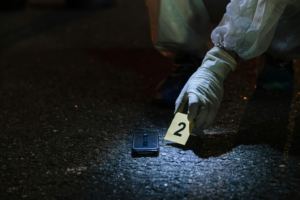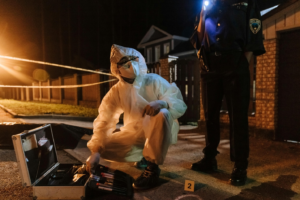Have you ever found yourself glued to the screen during a crime drama, marveling at the way detectives meticulously collect evidence at a crime scene, dust for fingerprints, and unlock the secrets hidden within a single drop of blood? Those thrilling portrayals of forensic science, often fueled by shows like CSI, have undeniably captured the public imagination. But how closely do these dramatizations reflect the reality of real-world forensics, particularly in the digital realm?
According to a study, a staggering 72% of jurors believed forensic science was more accurate than it actually is. This phenomenon, known as the CSI effect, can have significant consequences in real-world court cases. Unrealistic expectations about the speed, accuracy, and capabilities of forensic science can lead jurors to doubt legitimate evidence or place undue weight on inconclusive findings.
Here at Eclipse Forensics, a leader in computer forensics in Florida, we understand the critical role that digital evidence plays in modern investigations. Unlike the dramatic breakthroughs depicted on television, real-world forensics is a meticulous and nuanced discipline that requires expertise, experience, and the right tools.
In this blog, we’ll peel back the layers of the CSI effect, explore the fascinating world of real-world forensics, and delve into the essential services offered by Eclipse Forensics to ensure accurate and reliable digital evidence collection and analysis.
The CSI Effect: Fiction vs. Reality
While crime dramas like CSI entertain us with fast-paced investigations and flashy technology, the reality of forensic science is far more complex. Here’s a breakdown of some key differences:
The CSI Effect’s Misconceptions about Speed, Accuracy, and Technology in Forensics
The allure of crime dramas lies in their fast-paced narratives, where crimes are solved within the span of an episode. However, the speed at which investigations unfold on television rarely reflects the reality of real-world forensics. Here’s a breakdown of why:
- Meticulous Examination:Unlike the quick sweeps with fingerprint brushes on TV, real-world crime scene investigations involve meticulously examining the scene for even the most minute details. This includes documenting the scene layout, photographing evidence, and carefully collecting samples. This painstaking process can take hours, sometimes even days, depending on the complexity of the scene.
- Extensive Analysis:Once collected, evidence undergoes rigorous analysis in specialized laboratories. This might involve DNA testing, fingerprint analysis, or digital forensics for electronic devices. These analyses can be quite time-consuming, depending on the type of evidence and the complexity of the case. For instance, DNA analysis can take weeks or even months due to the intricate procedures involved.
- Backlog Burden:Forensic labs often face a backlog of cases due to resource constraints and the increasing volume of evidence. This can further delay the processing and analysis of evidence, extending the overall investigation timeline.

Accuracy is another area where the CSI effect paints a misleading picture. Shows often portray a single piece of evidence, like a single hair or fingerprint, as an irrefutable link to a perpetrator. In reality, forensic evidence is rarely so clear-cut:
- Inconclusive Findings:Forensic evidence can sometimes be inconclusive, meaning it cannot definitively identify a suspect or link them to the crime scene. For example, a single fingerprint may belong to multiple individuals who have touched the same object.
- Misinterpretation Risk:The interpretation of forensic evidence requires expertise and experience. Incorrect interpretation can lead to false leads or even wrongful convictions. This is why collaboration between forensic scientists and investigators is crucial for building a strong and accurate case.
- Need for Corroboration:On its own, a single piece of forensic evidence is often insufficient to convict someone. A strong case relies on a combination of evidence, including witness testimonies, alibis, and corroborating physical evidence.
Finally, the technology depicted in CSI can be misleading. While technology plays a vital role in modern forensics, it’s not a magic bullet:
- Skilled Operators Needed:Advanced forensic tools require skilled professionals to operate them effectively. These professionals need to understand the science behind the technology and be able to interpret the results accurately.
- Limitations of Technology:Forensic technology has limitations. Certain types of evidence may not be recoverable or easily analyzed, and there’s a constant race to keep pace with evolving criminal methods.
- Focus on Interpretation:Technology is a powerful tool, but it doesn’t replace the need for human expertise. The final interpretation of forensic data and its connection to the case still relies on the experience and judgment of skilled forensic scientists.
By understanding these nuances of real-world forensics, we can move beyond the distorted lens of the CSI effect and appreciate the true value of meticulous investigations, expert interpretation, and the responsible use of technology in uncovering the truth.
The Art of Real-World Forensics: A Meticulous Process

Real-world forensics is a delicate dance between preserving evidence integrity and extracting valuable data. Here’s a glimpse into the key steps involved:
- Scene Examination:The first step involves carefully documenting and securing the crime scene to ensure no evidence is compromised. This includes photographing the scene, taking notes, and properly collecting digital devices like computers and mobile phones.
- Evidence Collection:Digital evidence is collected using specialized tools and techniques to ensure it’s not altered or contaminated. This might involve creating a forensic copy of the device’s storage media to avoid tampering with the original.
- Data Analysis:Once collected, the data is meticulously analyzed using specialized software and techniques. This includes searching for deleted files, hidden partitions, and other relevant information.
- Documentation and Reporting:A comprehensive report is generated detailing the forensic process, the findings, and their interpretation. This report serves as crucial evidence in court proceedings.
The Importance of Digital Forensics in Today’s World
In today’s digital age, where much of our lives take place online, digital evidence plays a critical role in investigations of all kinds. From cybercrime and intellectual property theft to financial fraud and identity theft, digital forensics is essential for uncovering the truth and bringing perpetrators to justice.
Here are some key areas where digital forensics plays a crucial role:
- Cybercrime investigations:Digital forensics helps investigators track down cyber criminals, identify their methods, and recover stolen data.
- Employee misconduct:In cases of employee misconduct like data breaches or misuse of company resources, digital forensics can help to gather evidence and determine the scope of the problem.
- Civil litigation:Digital evidence can be crucial in civil lawsuits involving intellectual property theft, contract disputes, and other matters.
Why Choose Eclipse Forensics for Your Digital Forensics Needs?
At Eclipse Forensics, we are committed to providing our clients with the highest quality digital forensic services in Florida. Here’s what sets us apart:
- Certified Experts:Our team comprises highly skilled and certified computer forensics consultants and digital forensic engineers with extensive experience in various digital forensics
- Cutting-Edge Technology:We utilize the latest digital forensics tools and techniques to ensure the most accurate and comprehensive analysis of your evidence.
- Proven Methodology:We follow a rigorous and well-established methodology for digital forensics investigations, ensuring the chain of custody is maintained and evidence is handled with the utmost care.
- Unwavering Integrity:We understand the importance of maintaining the integrity of digital evidence. Our team adheres to the strictest ethical standards and can be relied upon to present unbiased and objective findings.
- Clear Communication:We understand that legal proceedings can be complex. We take pride in clear and concise communication, ensuring our clients fully comprehend the findings and their implications.
When you choose Eclipse Forensics, you’re not just getting a team of experts; you’re gaining a trusted partner committed to helping you navigate the complexities of digital evidence and achieve the best possible outcome in your case.

Beyond the CSI Effect: Unlocking the Power of Real-World Forensics
The CSI effect, while captivating, can create unrealistic expectations about the speed and certainty of forensic science. However, by understanding the meticulous process and the vital role of digital forensics in today’s world, we can appreciate its true power.
Real-world forensics is about meticulous data collection, rigorous analysis, and expert interpretation. It’s a crucial tool for uncovering the truth, ensuring justice prevails, and protecting us in an increasingly digital world.
Are you facing a legal matter that requires the expertise of a digital forensics consultant?
Here at Eclipse Forensics, we’re here to help. Our team of certified professionals can assist you with a wide range of digital forensics services, from data collection and analysis to expert witness testimony. Contact us today for a consultation and let our expertise empower you to make informed decisions in your case.
Together, we can ensure that digital evidence is collected, analyzed, and presented accurately and effectively, upholding the integrity of the legal process and helping you achieve the best possible outcome.

